Exit Interview: I Spent 20 Years Behind the Wheel of a Big Rig
Gord Magill, on the road (Photo: Courtesy of Gord Magill)
Long-haul trucking isn’t the sort of job where you can go to work, space out, and come home at night. Driving a truck means living a different type of day-to-day existence, roaming far and wide, sleeping on the road and, sometimes, exploring places that you’d never have gone otherwise.
Gord Magill has spent 20 years in the trucking business, which has taken him to New Zealand, Australia, the northernmost reaches of Canada, the U.S.-Mexico border, and on many, many roads in between. But now he wants to spend more time in one place, which means leaving the trucking business—or at least spending less time on the road.
Gord’s originally from Ontario, Canada, and is currently “stuck in limbo,” he says, trying to immigrate to the U.S. to be with his wife; we caught up with him in Melbourne, Australia, to chat about what it was like to spend two decades criss-crossing continents in a big rig.
How’d you learn to drive a truck?
We have to go back a couple of generations. It really starts with my grandfather, who was a tank driver with the Canadian army in World War II. He came home from the war, and after doing a kind of security gig at a nickel mine, he moved to southern Ontario and he started fixing trucks and working with one trucking company. My father and both of my uncles were involved in transportation and trucking. When I was a teenager, I went to work for a local trucking company they had a history with. I would go after school, and sometimes I would go in to load trucks at night, help the mechanics, and be an extra hand. I was driving a big rig before I had a license to do so, when I was 17 years old. I started at the bottom and worked my way up, the old school way.
A little bit of everyone taught me. There was this one old guy, Ed Watkins, who was one of the in-house trainers, but it was a combination of a bunch of different people. I’d picked stuff up riding with my dad, too. When I was 14, 15 years old, I would ride around with him during the summer. You pick things up along the way.
What sort of things?
It’s not a whole lot different than driving a car. You just have to be more aware of your space. If you’re driving a 48-foot trailer behind you, your handling is going to be different. You have to be aware of stopping distances and the weight. You have to be planning things a little bit better than when you’re in the car. It’s a lot of thinking about things that are going to happen behind the wheel. You have to understand that you don’t have the ability to quickly adjust like you can in a car.
What was your first gig?
I obtained my Ontario Class A truck license, which would be the equivalent of an American CDL [commercial driver’s license] a couple of months after I turned 18. When I finished high school, they put me on a contract hauling steel rolling pins, which are used in the production of steel at a major mill in Hamilton. I would go from the Dofasco roll grind shop where they ground the pins, and I would take them to the plant where they’d dip them in zinc. You’d then take them back to other spots, where they were rolling out steel, for use in stamping them out with different car parts. They were making steel for Honda, Toyota, Ford, GM and other car companies. That gig lasted a few months, and then the guys I worked for lost that contract.
Is that how companies usually operate?
Some truck companies will have the same contract moving the same thing for decades. Some companies have random stuff. I’ve done a little bit of both. I’ve hauled steel coils all over the place.
I’ve hauled t-shirts for rock bands, I was on tour with KISS for four months. I had a truck full of shirts and trinkets and stuff they sell at concerts. That was an interesting experience for a guy who was 21–just learning what Class A famous personalities are like in real life.
I’ve hauled airplane wings for Mitsubishi: they ship airplane wings from Japan and they go to the Bombardier plant in Toronto, to make the Canadair Regional Jet. They’re 16 feet wide, lying in a cradle on the back of the rig, so you’re being escorted down the road by wide load escorts and in some places, the police.
I lived in New Zealand for a year and a half and drove logging trucks. New Zealand has a lot of really skinny two-lane roads with hills and valleys and 15 to 35 kilometer/hour corners. I’ve hauled logs down the side of a volcano with a tree farm growing on the side. It was private off-road with no weight limits. I would put 65,000 kilograms [143,300 pounds] of logs on board and have to get that weight down the hill.
I’ve hauled automotive steel to the border at Mexico and bought mangoes and fresh fruit back to Canada. The company I worked for in Canada did contracts for the military. We hauled light armor vehicles for the Canadian military and the U.S. military. I would take them to Ft. Lewis, near Tacoma, Washington, and they would get them ready and send them on various missions of imperial conquest. I kind of regret being involved in that, but I was young and silly and not totally aware of what I was up to.
I did four seasons on the ice roads, in the northern part of Canada. I’d haul diesel fuel to diamond mines over frozen lakes for six to 10 weeks in the winter. I did a fair bit of hauling fertilizer throughout Saskatchewan for a few weeks after that, in the springtime. I just did a year and half of driving road trains in Australia—double and triple trailers out of Perth to communities in the North-West. They’re 53 and half meters [175.5 feet] long, and can weigh basically the weight of three and a half semis at once.
One of my interesting gigs was hauling trailers of ice around at Burning Man for Arctica, the ice retailers at that great festival. I’ve worked with Arctica at four Burns, and it’s always a fun time.
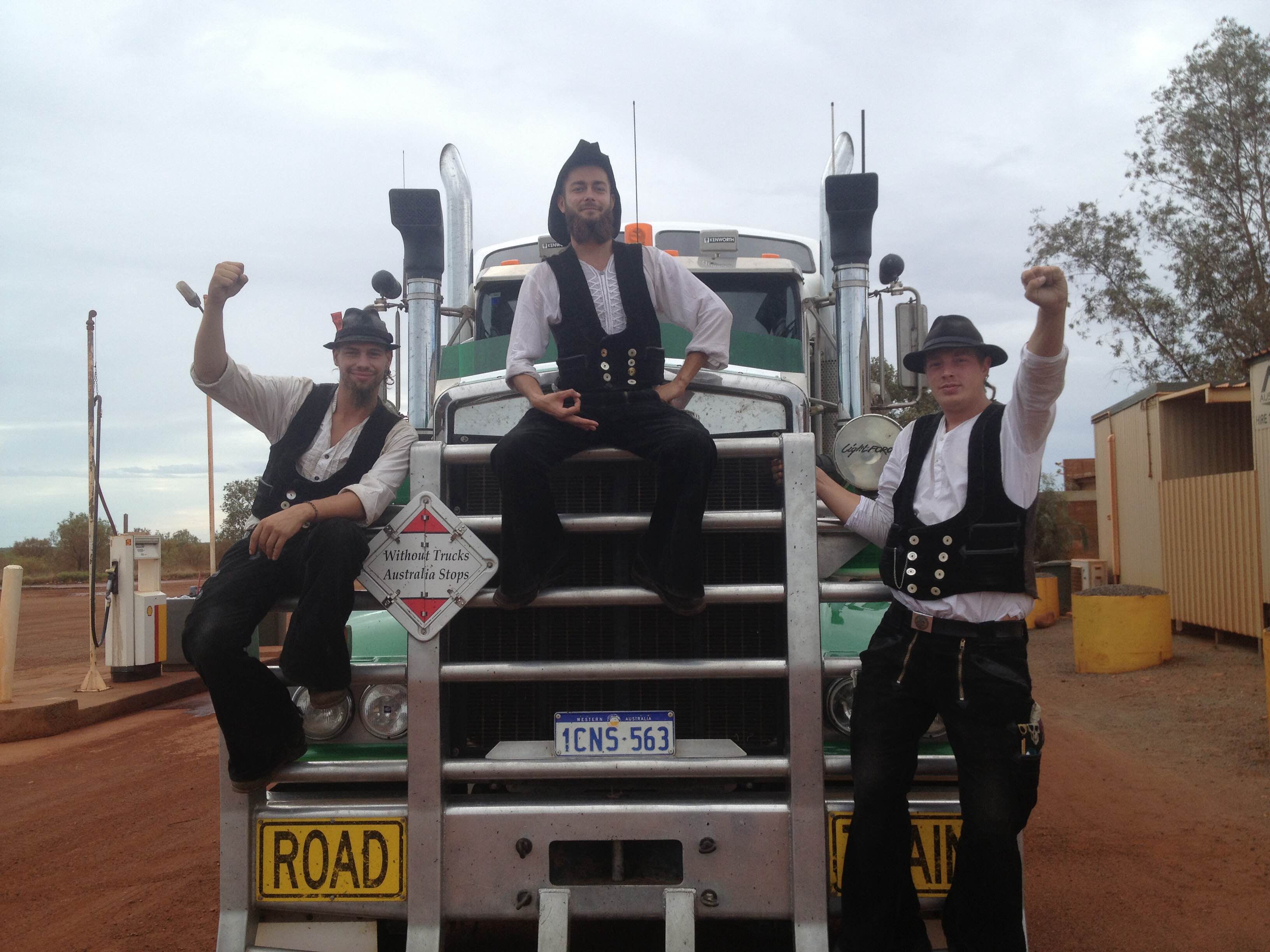
“Oh, the hitchhikers. So many hitchhikers.” (Photo: Courtesy of Gord Magill)
How much choice do you have in where you go and what you’re hauling?
It depends on who you work for. My life in trucking is somewhat unique because the guys I worked for initially in Canada were willing to let me come and go from my job working for them. I managed to get different gigs in different places, and that has provided me with all these opportunities. Working within any particular trucking company, my choice would have been more limited based on their customer base. There’s a pecking order about who gets what loads, skill, seniority, how well you get along with the boss, how well you get along with the customers. The number of places I’ve been mostly has to do with myself moving around and taking on different jobs. The company I worked for, they have a pretty wide customer base. But it was mostly me.
What makes a good job?
It’s very particular to the driver. My definition of a good job is: I need to get along with the person I’m working for. A good job for me is one where I have autonomy and one where I drive in remote areas. I’m not a fan of places where there’s traffic and a whole lot of law around.
Hard is also subjective. I tell people I drove the ice, and they say: you must have been scared or it must have been nerve-wracking. But, it’s super chill. There are no cars, there are no cops, you’re only doing 25 kilometers an hour [15.5 miles per hour] across the ice going to the mines loaded, and between 35 to 60 kilometers an hour [21-37 miles per hour] returning south. It’s quite tedious. But it’s not hard.
Certain gigs require being on your feet all the time. If you’re hauling logs out in the bush, you have to know the truck and really pay attention. That could be hard or hard work. Maybe I’ve been doing it so long, I don’t think of it as hard.
Why are logs a challenge?
Your loads are always heavy. You tend to be operating on narrow gravel or dirt roads in the bush. You have to coordinate with other trucks in order to pass each other. If you’re in the mountains, you have to use the truck’s engine and gearing to get yourself down without using your brakes, so you don’t burn your brakes out. You’re on zig-zag roads going down the side of the mountains. There are a lot of things that could go wrong. You really have to be on your toes.
At one time being a logging truck driver was the most dangerous job in New Zealand. They kept tipping over on their sides. Now, they’ve redesigned their trailers and put work into the construction of roads going into or out of the bush. Like any other industry, there’s a lot of improvement over the years. There’s a learning curve.
What’s a bad route like?
I got really tired of crossing the border between Canada and the United States. You’re dealing with bureaucracy going over the border. You get into a lot of bottlenecks at border crossings. It’s a lot of hassle you just don’t get paid for. It’s just considered part of the job.
There are also places where states or provinces think of trucks as rolling piggy banks. They just harass us. You don’t go to California. British Columbia is also bad, B.C. in old trucker slang meant Bring Cash. New York City is a great place to visit, a hard place to work. The Northeast corridor in the U.S. is a shitshow to be avoided for all cost, as far as I’m concerned. It gets a bit hectic, and I’ve done it, I’ve trucked New York. It’s not my first choice of a thing to do, but it’s there.
How does the payment work?
It varies from company to company. You’re moving certain products, so some industries have very specific practices. If you’re hauling livestock, you’re hauling livestock all the time, because you can’t put anything else into that truck. If you’re doing petroleum products, you’re just doing petroleum products. Each of those industries have requirements, and they’ll all have different rate structures. Some will pay by the load, by the hour, by the mile. Some companies will reimburse you for certain delays.
Some are more competitive. Refrigerated trucking is very competitive, and you don’t get paid well. It’s easy to get into. If you’re buying a truck, and you’re new to the business, a general fridge trailer is just a big box. They load everything in, you close the doors, and you drive. There are not a whole lot of work or thought involved in it. Those tend to be entry-level things. Some guys, that’s all they want to do. They just want to go and haul stuff, and not think about it. There’s more people in that line of work, so it’s more competitive and so it pays less.
Certain refrigerated commodities have to be there on time, and maintained at a certain temperature. so that can pay alright. But if you’re hauling strawberries out of California and they need to be there at a certain time and at a certain temperature, without fungus or mold…if anything goes wrong and the load goes bad, you have to pay for all the product, and you don’t get paid.
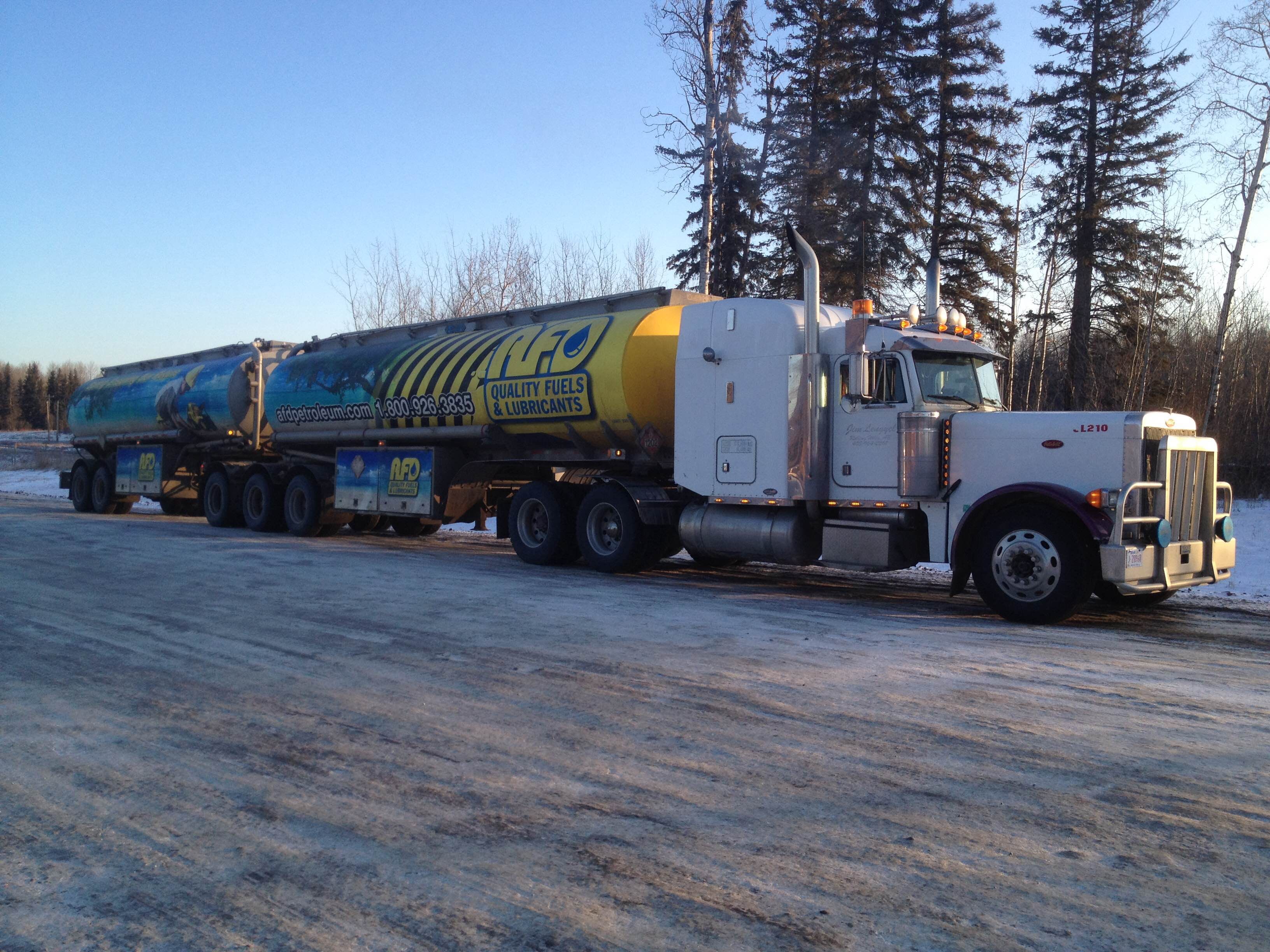
In colder climes (Photo: Courtesy of Gord Magill)
What have been some of the greatest moments for you?
I’ve met some pretty amazing people. I’m still friends with people I worked for in Canada. We still send emails and talk shop. One of the guys I met on the ice got me this job in Australia, and another guy I hauled logs with in New Zealand came and ran the Ice with me. I’ve maintained some good friendships with very interesting people I’ve met on the road. I’ve been to all 48 states. I’ve trucked in every province and territory in Canada. I’m one of the few people who can say I’ve driven to Nunavut. I’ve gotten to go to some beautiful places and met some excellent people and for that I’m grateful.
It’s interesting you say that because to me the stereotype would be that you’d be alone all the time.
I do spend a lot of time alone. But at either end of where you’re going, you meet people. Sometimes you’re working with other truckers. If a number of loads are going from the same point to the same destination and it requires a number of trucks, then when we travel together, we are in a group. We help each other load and unload, or with any problems we experience going down the road.
The ice is a pretty small group of guys who go up and do the ice every year. It creates a connection…I think the right word would be camaraderie. You stop in Yellowknife, and you eat together, or you’re helping each other with a repair on the side of the road. You’re working in these extreme conditions, and you build a bond. You’ll have lots of time of not seeing them, and not seeing your friends or family, or not seeing your wife for two weeks in a row or six weeks in a row. But when you do see those people, it’s extra special.
You mentioned music, too, before we started the interview.
I do have the time to listen to a lot of music, though my music collection is pretty piss-poor and I don’t download a whole lot of tunes, to be truthful. Of the music that gets me through the day on the road, I tend to listen to a lot of psychedelic trance, psy-techno, sometimes old country, sometimes soulful alt-country stuff like Neko Case…
I guess I listen to music that elicits good memories. I spend a lot of time thinking about my friends and family, so if I shared a moment with some folks to certain tunes, those are the tunes I prefer. I also listen to a decent amount of podcasts and audiobooks, typically in regards to politics, ideas, history, anything about the how and the whys of where we are in the world.
What about talking to other truckers over the radio? Is that really a thing?
CB Radios are a major thing in the trucking universe. CB’s are how we share info about weather, where the cops are hiding, traffic conditions, local directions, or just having someone to speak with. In certain applications, especially out in the bush, the use of VHF radios is mandatory for relaying your position on the road, so that we can pass each others trucks safely. Many bush roads are pretty treacherous and narrow, and knowing where everyone’s location is an absolute must.
Some guys are into HAM Radios and have them in their trucks, but I am not one of them, nor very knowledgable about that type of radio and how it is used.
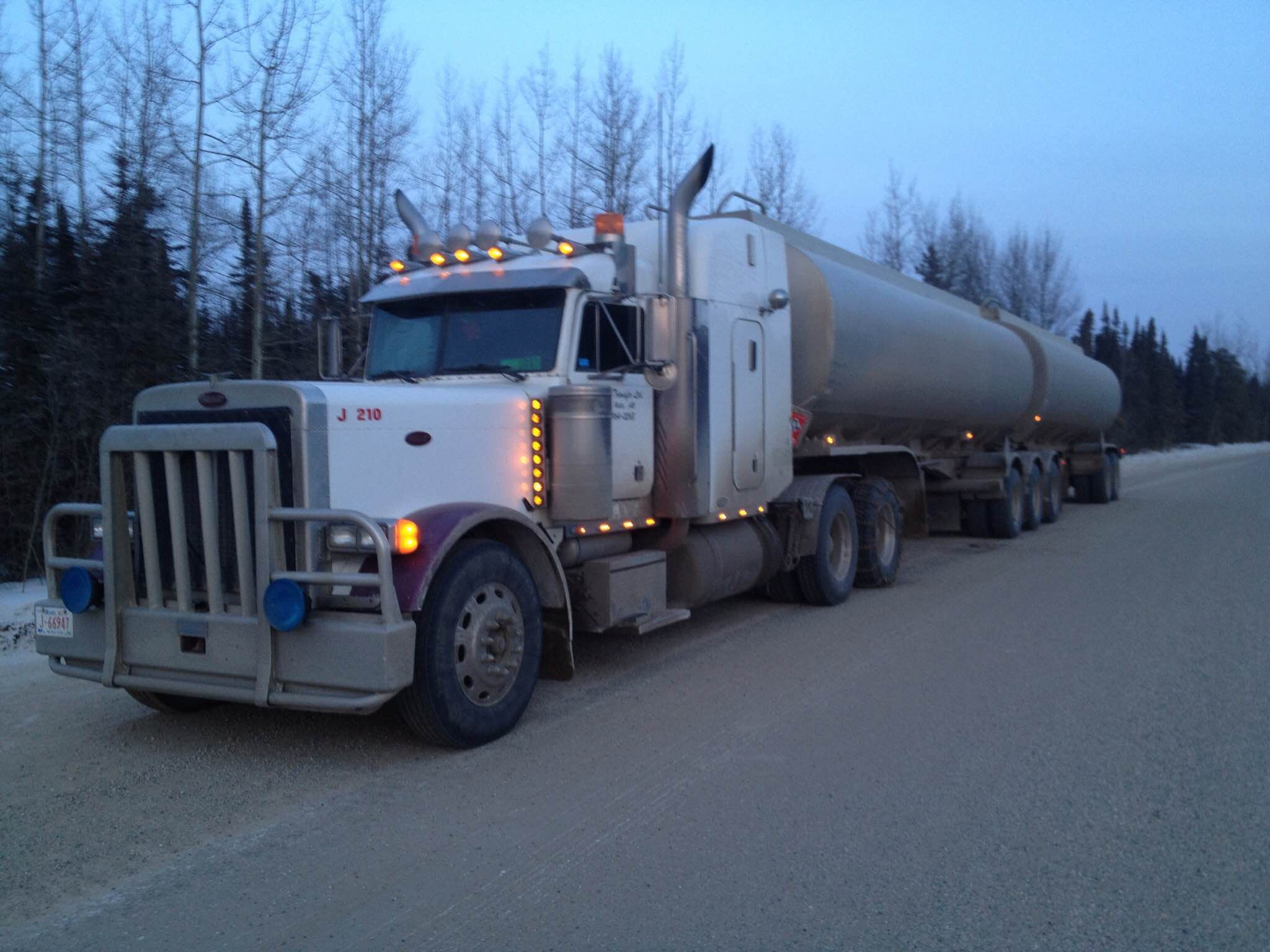
Just chillin’ (Photo: Courtesy of Gord Magill)
What sort of problems do you run into on the road?
Blown tires. In Australia, we change our own tires. In North America or Europe, you call a tire guy from Goodyear, or somewhere, and they come out. Here we change tires ourselves because of the remote nature of the place. You’ll have fan belts let go or your alternator belt on the engine. Air hoses wear out, and if your air system goes out, brakes go out and then you’re stuck. Anything that can go wrong….things happen. Small things, you can fix or rig them up to get to the next place. But sometimes you’re beached, and someone has to come rescue you.
I got stuck in Wyoming once for a couple of days because a specialized brake valve broke on my truck, when I was going from Nevada back to Ontario. I got stuck in Evanston waiting for a part. I’ve heard of people being stuck in a place for a week. My dad blew a diff in the Mack he was driving in Quebec in the 1980s. He had to help the local mechanic who didn’t speak any English to tear apart the diff, wait for the parts to come down from Montreal, and he got stuck there for four or five days.
Did you ever own your own truck?
One guy I worked for was a farmer who subcontracted his truck to a fuel distributor. Then I had to treat it like I owned. But whether or not you own the truck is irrelevant. You need to treat it like you do because you get better performance out of it. You need to get down the road and get the job done.
Tell me more about the road trains in Australia.
Four trailers long is a pretty standard unit in parts of Australia. They call it a quad. There’s very little rail service here. When you’re hauling bulk commodities like bauxite, gravel, iron ore, manganese, or cement, getting the most of it moved at the cheapest possible price is a pretty high priority. So you drive as much weight behind you as you can. Because there’s no one out there, and the terrain is relatively flat most places… I think you’re allowed 162,000 kilograms, which is near 400,000 pounds, which is the weight of five standard American semis.
The trucks need to be engineered that much better to do it. You have to be very easy on the equipment. The drive line is under so much pressure and stress trying to get that much weight up to rolling speed, and maintain that speed, that when you’re shifting you have to become “one with the truck,” so to speak. You don’t want to grind the gears, or miss shifts or slam gears. You have to be a smooth operator.
What surprises people most about your job?
I’ve never asked anyone, but generally speaking, people who aren’t from Australia are generally wowed by the sizes, dimension, and weights of the things we drive. I can be a bit nonchalant about it, because I’ve been doing this for 20 years, but people are taken aback when I tell them it’s not that hard. When you’ve been doing something for so long, it becomes second hand. It’s easy.
I think people are somewhat intimidated. When the average person drives down the road and sees this thing, they’re taken aback by it. Foreign tourists would film me when I was driving by. It’s exotic for them. It’s not exotic for me. If I say critical things about the Ice Road Truckers show, people understand that TV is full of shit, but when I tell them the job is actually kind of tedious and the hours and the time wear on you more than worrying about falling through the ice, that’s a bit of a reality check.
Why are you stopping?
I met my wife at Burning Man, and right after I went to New Zealand and I was gone for a few weeks. When I came home, the first two years we were together, I spent five to six months in Alberta, hauling fuel. We were on opposite ends of the continent. She came to Australia, and I was on the road all the time here. I’m going to try not be on the road as much. I may have to do a little bit of trucking still, but we’re hoping to avoid it.
What what will you miss, and what will you not miss?
I’m going to miss making my own food on the side of the road. I’m going to miss the pleasure of my own company because that’s important in the trucking business. You have to be fine with being by yourself for a long stretch of time. I really enjoy being behind the wheel of a Kenworth and left to my own devices. I’m going to miss that. I’m going to miss remote scenery. I really liked being in the bush in Canada and in the outback in Oz. I’m not going to miss some of the micromanaging people. I’m not going to miss cops.
What do you think would help people understand what it’s like to do this job?
Most people understand that we spend a lot of time by ourselves and on the road. I think people know that it’s not just driving, it’s not just a job. It’s a lifestyle and a way of thinking. There are a lot of factors that affect you when you’re on the road. There are a lot of things that can make your job very fucking difficult, or impossible to complete sometimes. Cops. Weather. Mechanical breakdowns. There are just so many things that can screw your day up, that for the most part don’t affect the average person who goes to work in an office or at factory. There are just a range of things that can be good and bad each day in the trucking business.




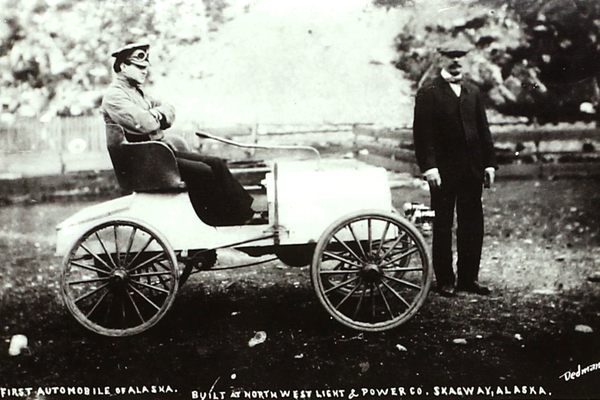

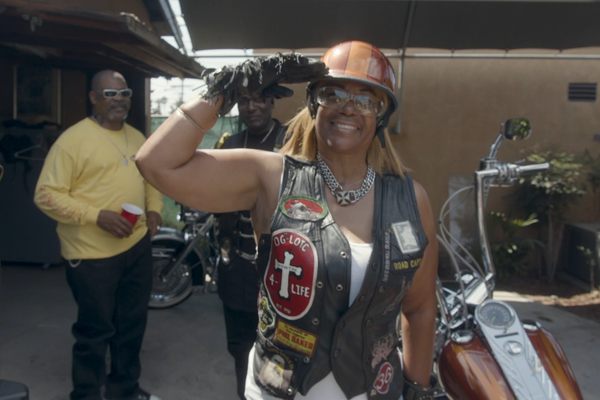





Follow us on Twitter to get the latest on the world's hidden wonders.
Like us on Facebook to get the latest on the world's hidden wonders.
Follow us on Twitter Like us on Facebook